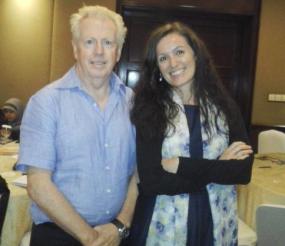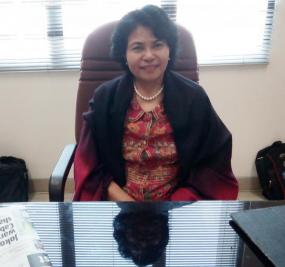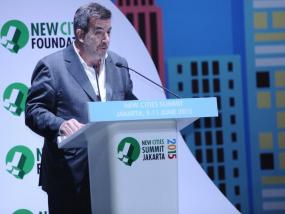Strategic Review Forum: “Pluralism and Progress: Indonesia’s Hope,”
Jan 16, 2013, Four Seasons Hotel, Jakarta.
“You can’t have a government ministry that only focuses on one religion:” Exclusive interview with Ima Abdulrahim
Ima Abdulrahim is the Executive Director of The Habibie Center. She moderated the forum.
Strategic Review: What is your view towards Pluralism in Indonesia?
Ima Abdulrahim: Our forefathers had it right when they established Pancasila -- we always pride ourselves in our diversity and unity, but we’re losing sight of that, I think. Pluralism didn’t used to be something we took for granted, we have the Sumpah Pemuda (the nationalist Youth Pledge from Oct. 28, 1928). We never discussed that during the Suharto era but we need to learn to live together. Then along came radicalism and different opinions. In the Suharto era, there was a sense of force, Pancasila became an indoctrination used as tool to keep people from becoming violent.
If you look at Pancasila and its principle, unity in diversity, it is something you need to live by. But for the young generation, Pancasila is considered old fashioned. If there is going to be diversity, we need to strengthen Pancasila through education not indoctrination so that people believe it in their hearts. At the birth of Indonesia we started out very diverse with a sense of belonging. Even during the time of the Prophet Mohammad, he embraced everyone that was different. All religions out there have to realize this.
Take MUI, the Indonesian Council of Ulema. Don’t you think it’s a problem that its leader (petinggi agama) says that Muslims are not allowed to greet Christians a “Merry Christmas?”
We need to give people the benefit of a doubt. He is entitled to say whatever he wants to say and MUI has the right to say these things. However, it is still up to the people to do what they desire. MUI is just a consultative body that is supposed to guide people. Having pluralism engraved in your heat is important.
For me, the law that I follow is the law of the Quran, and we recognize the Prophet Isa (Jesus Christ) and the immaculate conception and we don’t disbelieve that. I am not saying that I legitimize your faith. I’m saying that if you say, “Happy Eid Mubarak” to me, it is more on the line of wanting to establish relations with other people, that is what’s important. “Silaturahmi,” or maintaining good relationships, is encouraged in Islam. There are a lot of misconceptions about that. People focus so much on the ritual and don’t focus on the implementation in life. They forget that education is the important thing. How people should dress and act and make a living is part of a religion also but at the end of the day all you have is the relationship with other human beings and the relationship with the higher motives that you believe in.
SR: Why do you think intolerance is increasing?
Ima: Action and behavior are driven by intentions. There is an intention behind every action and political calculations are made on whether to act or not to act. This is my opinion, that they’re (government leaders) gathering political capital for the next election. Their goal is the next election, that’s political science 101, the only rational reason that those in power are not doing anything is politics. I believe that the lack of action by the current powers to counter radicalism is purely motivated by politics. A lot of moderates that don’t believe in radicalism are not speaking out. I am very critical of Islam; the biggest weakness is that we sometimes like to blame other people. First, we are poor and we blame the West. This is a Muslim mentality, applied to the Palestinians, for example. It is very common for Muslims to blame other people.
SR: What can be done to combat attacks on minority groups, church bombings and other acts of marginalization?
Ima: When acts of terror and violence are treated for what they are, I think we will have less of them. We have a problem with leadership and law enforcement that doesn’t work. When you punish the victims then there is something wrong with the justice system
SR: Do you think that law enforcement can control religious intolerance?
Ima: Law enforcement shouldn’t be biased, a crime is a crime. For example, say a Muslim attacks a Christian, If a policeman is Muslim, he has to act according to his job. At the end of the day, you should side with justice and law enforcement needs to be unbiased and objective. You watch any documentary about crime and you know that a justice system cannot side with anyone other than the innocent.
SR: What do you think about democracy?
Ima: A lot of people blame our openness for some of our troubles. It is a matter of how you interpret democracy, I will always stand by that. I wouldn’t blame Islam for Muslims carrying out the attacks on 9/11. I blame those individuals; I don’t blame their religious belief.
SR: Do you think Mosque and State should be separated in Indonesia?
Ima: We are not a Muslim state and the fact that the Ministry of Religious Affairs focuses on Islam, I think is already biased. I am one of those people who believe that the religion ministry should be abolished. You can’t have a government ministry that only focuses on one religion. I will debate this with anyone.
SR: Can you tell us a bit about your work with The Habibie Center?
Ima: Under a democracy, pluralism has to be addressed. We contribute on issues that focus on the welfare of all. In terms of media, we have a media literacy program and we have also done peace education programs in Papua. Our media programs aim to teach the younger generation how to use the media and not jump to conclusions.










%20resized.png)
